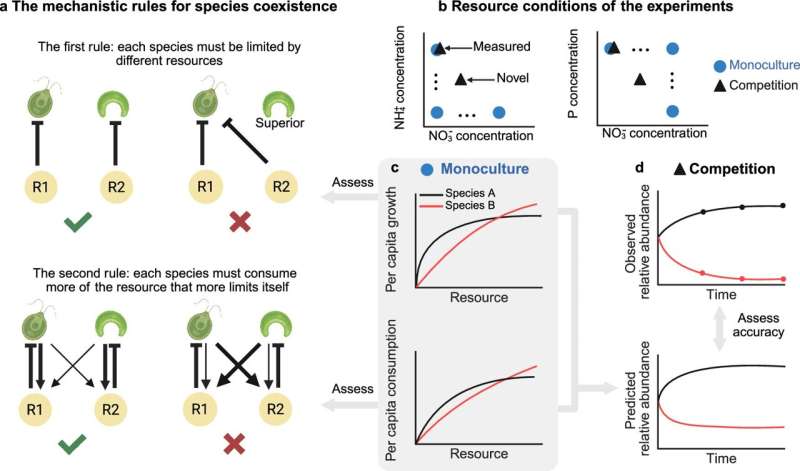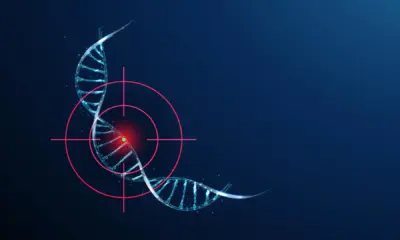Science
Researchers Unveil Mechanistic Model to Predict Ecosystem Changes

Researchers at the University of Konstanz have developed a mechanistic model that accurately predicts the development of biological communities across various ecosystems. Published in Nature Communications on November 13, 2025, the study focuses on freshwater algae and explores how community composition can shift dramatically based on environmental conditions.
Biological communities are inherently dynamic, often changing in response to factors such as nutrient availability and competition among species. The need for effective predictive models has grown as researchers seek to understand these fluctuations. Mechanistic models, which are grounded in the underlying biological mechanisms that allow different species to coexist, have emerged as a promising approach.
Extensive Research and Innovative Techniques
The research team, led by Lutz Becks, a professor of limnology, rigorously tested the mechanistic model against empirical data derived from extensive experiments. This research builds on theories from the 1960s, yet technological advancements have only recently allowed for comprehensive testing. Becks noted, “While previous studies had some success, a complete exploration of the model required a vast number of experiments, which modern laboratory equipment facilitated.”
To lay the groundwork for their study, the researchers executed 864 growth experiments to assess nutrient requirements and consumption patterns among various freshwater algae species. Thanks to high-tech laboratory equipment, this process was streamlined, with lab robots preparing monocultures and automated systems conducting algae counts using advanced high-throughput microscopy.
The team then performed an additional 960 experiments to analyze mixed-species communities under different nutrient conditions. By comparing the model’s predictions with actual community development, they found that the mechanistic model demonstrated a high degree of accuracy in predicting species composition.
Ecological Insights and Future Applications
In their investigation, the researchers also revisited two ecological rules established by biologist David Tilman, which describe how competing species interact over limited resources. Their simulations revealed that while the first rule holds universally—that species must be limited by different resources—the second rule applies only to replaceable resources, not essential ones. Zhijie Zhang, the study’s first author, emphasized the importance of distinguishing between these resource types in ecological modeling.
The implications of this research extend beyond theoretical insights. The team plans to apply their model to a project focused on enhancing CO2 sequestration through phytoplankton. This initiative, supported by funding from the Vector Stiftung, aims to identify resilient phytoplankton communities capable of effectively sequestering CO2 even amid changing environmental conditions.
In conclusion, the mechanistic model developed by the University of Konstanz researchers offers a valuable tool for predicting the dynamics of biological communities. This research not only enhances our understanding of ecological interactions but also holds potential for practical applications in environmental conservation and biotechnology.
Further details can be found in the original study: Zhijie Zhang et al, “Mechanistic prediction of community composition across resource conditions and species richness,” Nature Communications, DOI: 10.1038/s41467-025-64935-5.
-

 Technology5 months ago
Technology5 months agoDiscover the Top 10 Calorie Counting Apps of 2025
-

 Health3 months ago
Health3 months agoBella Hadid Shares Health Update After Treatment for Lyme Disease
-

 Health3 months ago
Health3 months agoErin Bates Shares Recovery Update Following Sepsis Complications
-

 Technology4 months ago
Technology4 months agoDiscover How to Reverse Image Search Using ChatGPT Effortlessly
-

 Technology1 month ago
Technology1 month agoDiscover 2025’s Top GPUs for Exceptional 4K Gaming Performance
-

 Technology3 months ago
Technology3 months agoElectric Moto Influencer Surronster Arrested in Tijuana
-

 Technology5 months ago
Technology5 months agoMeta Initiates $60B AI Data Center Expansion, Starting in Ohio
-

 Technology5 months ago
Technology5 months agoRecovering a Suspended TikTok Account: A Step-by-Step Guide
-

 Health4 months ago
Health4 months agoTested: Rab Firewall Mountain Jacket Survives Harsh Conditions
-

 Lifestyle5 months ago
Lifestyle5 months agoBelton Family Reunites After Daughter Survives Hill Country Floods
-

 Technology4 months ago
Technology4 months agoHarmonic Launches AI Chatbot App to Transform Mathematical Reasoning
-

 Health3 months ago
Health3 months agoAnalysts Project Stronger Growth for Apple’s iPhone 17 Lineup





















